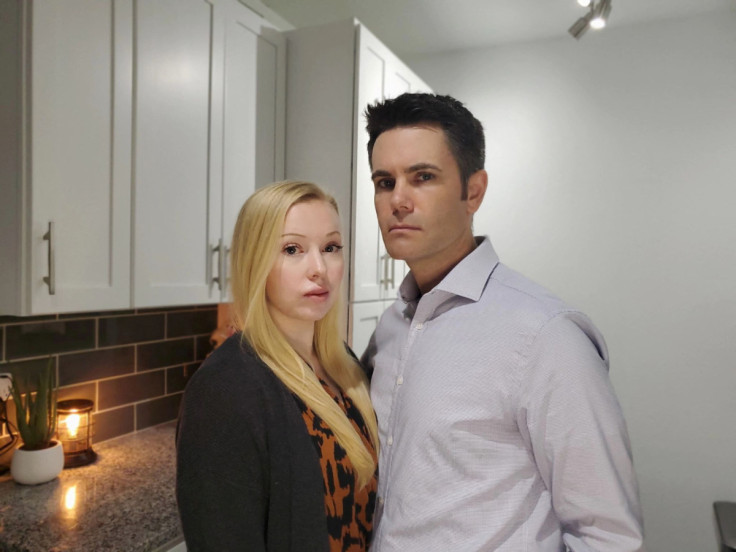How Texas' Abortion Ban Hurts Big Oil's Effort To Transform Its Workforce

As Texas officials moved to restrict abortion, promote Christianity in schools and the state's power grid teetered on collapse, oil worker Steven Beaman and his wife Hayley Hollands decided it was time to live elsewhere.
By April, Beaman had joined a communications firm in Colorado, leaving behind a more than decade-long career in oil and gas, and Hollands, an attorney, soon followed, forsaking the state over its increasingly strident politics and polarization.
"It is kind of the first time I've reckoned with the idea that I don't think I'm going to live in my home state ever again," said Hollands. She likened the climate contributing to the couple's decision to leave Texas to "death by a thousand paper cuts."
Oil companies have spent millions to counter the frayed image of fossil fuels and recruit a younger and more diverse workforce. But a flaring of political culture wars - around abortion, religion and LGBT+ rights - threaten to undo hiring and retention goals, according to interviews with more than two dozen workers and a national survey.
Over half of women between 18-44 years and 45% of college-educated male and female workers would not consider a job in a state that banned abortion, according to a survey of 2,020 U.S. adults last month by opinion researcher PerryUndem.
BP, Chevron, Exxon Mobil, Shell and TotalEnergies did not comment on how abortion and cultural wars are affecting their hiring and employee retention when asked by Reuters.
GRAPHIC: Workers weight abortion bans in career decisions
RECRUITING HURDLE
"It has always been difficult to attract women into oil and gas," said Sherry Richard, a 40-year oil industry veteran most recently human resources chief at offshore driller Transocean Ltd. "When you create an environment that is unfriendly to women, it just makes it harder," she said.
Richard, 66, who now sits on the boards of two oilfield firms, said she does not plan to leave the state, but would support her son and his family if they moved.
The business risks to recruiting is especially high for oil companies, already unpopular with graduates of engineering programs, said Jonas Kron, chief advocacy officer at Trillium Asset Management. The Boston-based firm, which oversees $5.4 billion in investments outside of oil, is asking companies to take action to minimize the financial losses of a limited workforce.
"Lack of diversity is not only a problem to financial performance, which they are acutely aware of, but also one of company values," Kron said. "That is deeply concerning."
Some California members of the Society of Women Engineers (SWE) have declined to attend the group's conference in Houston in October because of the state's anti-abortion law, which bans most abortions after about six weeks. The only exception is when a doctor certifies the mother's life is in immediate danger.
SWE after next year will not hold conferences for its 40,000 members in states with abortion bans due to "restricted access to women's healthcare," according to its website.
Trevor Best, chief executive of Syzygy Plasmonics, a Houston-based startup whose chemical reactors run on renewable electricity, recently had a woman job candidate from out-of-state say she would not consider relocating to Texas.
Texas Governor Greg Abbott has acknowledged the state is losing workers, but does not regret the departures. "We have an exchange program going on," Abbott said in August at a conservative political gathering. "We are getting California conservatives; we are sending them our liberals."
SILENCE ON ABORTION
The five top oil majors have said they support travel for health treatments by employees in different states. But none named abortion in their responses, nor disclosed whether there is an internal guidance for abortion care, a concern for employees who have to administer the policies.
"The rules are not clear," said a Texas engineer who also does recruiting for an U.S. oil major in Houston and declined to be named. "Will (an employee) have to tell her manager the reason of the trip for instance? I have asked for clarity, but I received no reply."
Some workers want their employers to take a stand on abortion.
"Companies say they value employee's rights and yet finance politicians who violate my rights and wellbeing," said a 45-year-old engineer at oilfield service firm Halliburton who declined to be identified fearing reprimands. "This is hypocrisy," she said.
Oil companies contribute to politicians who advocate for free trade, tax and energy policies through political action committees (PACs). That criteria fits a majority of Republican politicians who also vote to restrict abortion rights.
A California-based Chevron engineer who is planning to have a child and also declined to have his name used said he told his boss that he could not go ahead with a relocation to Houston.
"We find it medically unsafe to carry a pregnancy in Texas," he said, adding his wife is at high risk for ectopic pregnancies. With doctors in Texas now only able to perform emergency abortions in event of immediate danger to the mother's life, "that is too close to call for me."
Dawn Seiffert, 52, and her husband, an oil company employee, returned to Texas in 2012 and planned to stay. But with Texas' anti-abortion law implemented, the mother of four is considering moving with her daughters to Maine while her husband remains to earn full retirement benefits.
Texas politics "even before Roe" were heading in the wrong direction, Seiffert said. "The public education, the grid... they're more consumed with personal freedoms versus any responsibility towards one another," she said.
© Copyright Thomson Reuters {{Year}}. All rights reserved.





















